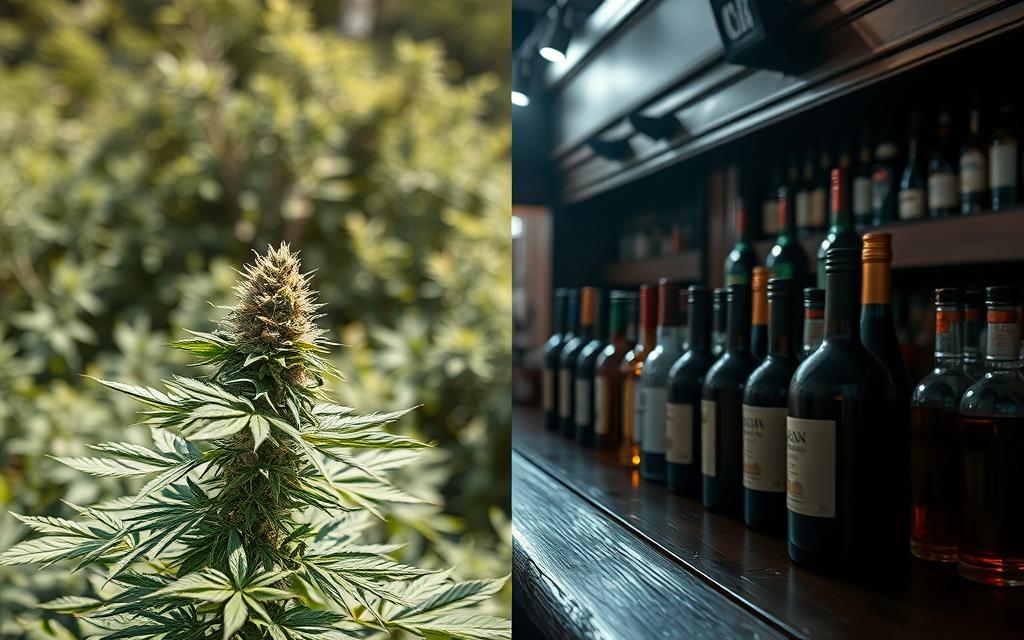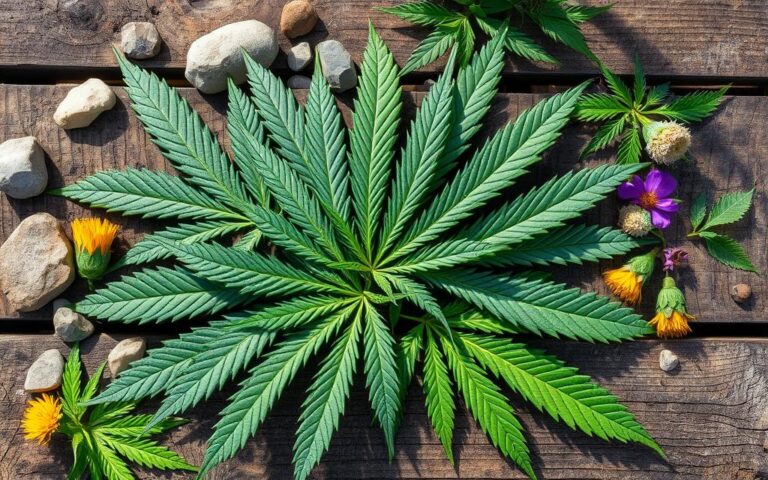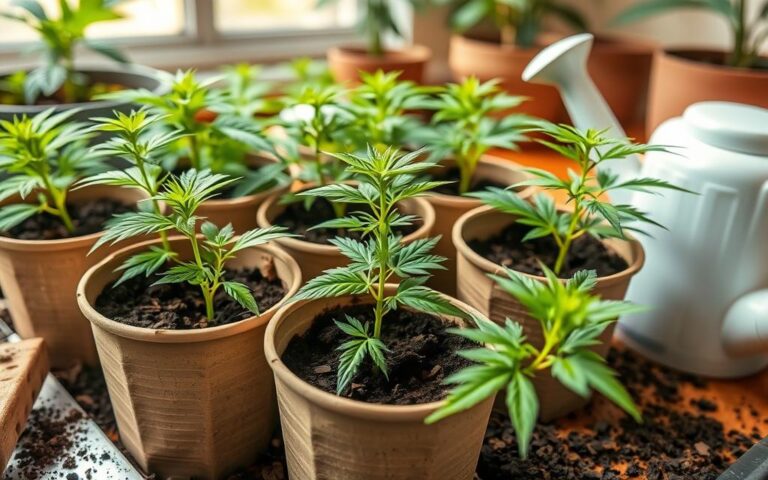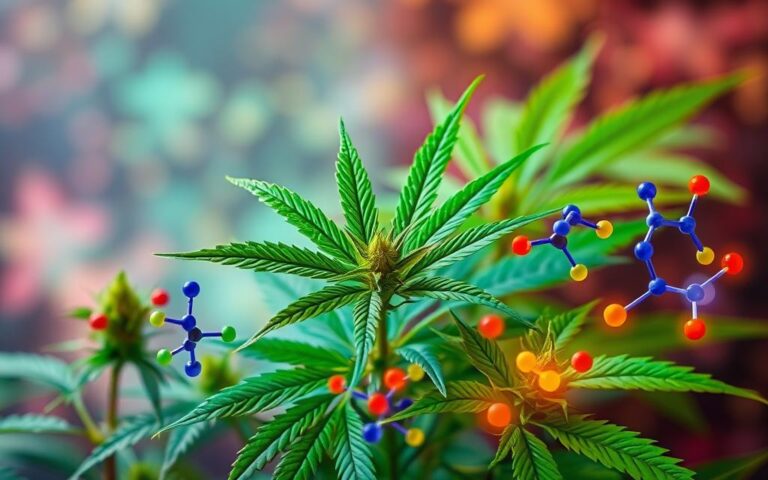Did God Create Weed? A Look at Religious Perspectives
The question of whether God created weed sparks debate among different religious views. With the recent legalisation and potential health benefits of cannabis, people are looking towards religion for answers. The Book of Genesis suggests that God made herbs bearing seeds, hinting at the divine creation of cannabis.
Marijuana has been valued for centuries for easing pain and calming nerves. However, exploring its place in faith also means facing its downsides, like addiction and its impact on community life. The Apostle Paul’s words in 1 Corinthians 6:12 teach us that not everything permissible is good for us.
We aim to explore the connection between cannabis as a divine blessing and the responsibility it brings. This journey will help believers navigate the world of cannabis within their faith.
Introduction to Cannabis and Religion
Many spiritual traditions have deep connections with cannabis. They see it not just as a plant, but as a way to touch spirituality and link with divine creation. Exploring this within religion looks at both old practices and new opinions.
Religious views on cannabis change as society does. For example, places like Minnesota have made it legal for personal use. This changes how people see its role in their faith. Since many religious books don’t ban cannabis, people find its meaning for themselves or within their community.
The Bible talks about the importance of sobriety and being in control, pushing for a life of mindfulness. Yet, it doesn’t directly address cannabis, showing the complexity found in many holy writings. Ancient Egyptians and Assyrians used it in their incense, showing its long ceremonial importance.
As the cannabis debate goes on, religious beliefs and cultural changes will influence each other. This invites a closer look at how to blend cannabis, religion, and spirituality in today’s world.
| Aspect | Religious Viewpoints |
|---|---|
| Biblical Interpretation | Ambiguous; no direct commands regarding cannabis |
| Historical Use | Used in rituals by ancient Egyptians and Assyrians |
| Modern Legalisation | Secular law’s growing acceptance is influencing religious discussions |
| Spiritual Connection | Seen by some as a means to deepen spiritual experiences |
| Buddhist Perspectives | Diverse; some embrace medicinal uses, while others prefer abstinence |
The Biblical Narrative on Creation
The story of creation in Genesis is deeply meaningful. It shows the start of our relationship with the natural world. God created a beautiful environment and saw that it was “good.” This story is a base for discussing plants like cannabis within faith. Every part of creation has value and purpose, making us think about life’s meanings.
Genesis: The Roots of Creation
Genesis offers a detailed look at creation, showing God’s power as He made the earth and everything on it. An important part is when God creates plants: “Let the earth bring forth grass, the herb yielding seed, and the fruit tree yielding fruit” (Genesis 1:11). This shows that all plants, including cannabis, have a divine purpose. People use these verses to say cannabis has a role in spiritual talks.
The Significance of Creation in the Scriptures
Creation’s importance is more than just existing; it’s about God’s plans for us and nature. The Bible shows everything has a role in God’s plan. It tells us to care for nature and enjoy what it gives. Many see this as a nudge to respect all plants for their uses in food, medicine, and pleasure. It opens discussions on where cannabis fits in God’s vision.
Did God Create Weed? Exploring Spiritual Insights
Plants do more than just feed us or look nice. Cannabis, for instance, helps people find spiritual truths. Many believe it was made with a special purpose. It lets us feel closer to nature.
The Divine Purpose of Plants
Cannabis helps us discover ourselves and our spiritual side. Its role in spiritual practices shows us its value. When people use it, they can feel wiser, almost like they get teachings from far-east philosophies.
Users often describe a sense of unity and love for the universe. It’s like they’re in a vast sea of consciousness. They feel they belong and see the world as a more forgiving place.
The Interpretation of “Good” in Creation
Seeing cannabis as a way to find divine truth changes things. Ancient writings and cultures saw it as sacred. It helped connect them to something greater and freed their minds.
Its holy use suggests “good” could mean help in personal growth and understanding. For many, it’s a way to see beyond usual beliefs. It encourages independence in one’s spiritual journey.
| Aspect | Details |
|---|---|
| Historical Use | Utilised in ancient spiritual rituals, including Vedic Soma and Persian Haoma cults |
| Spiritual Insight | Induces states resembling enlightenment, fostering self-awareness and clarity |
| Cultural Connections | Linked to Eastern practices such as meditation and karma |
| Psychoactive Effects | Encourages a unique interaction with the internal cannabinoid system, promoting healing |
| Modern Interpretation | Recognised as a tool for psychological evolution and spiritual democratization |
Cannabis in Historical Religious Contexts
The use of cannabis is deeply rooted in ancient religions. It’s been a sacred herb in many spiritual rituals and healing practices. By exploring these traditions, we can see how cannabis fitted into their religious texts. This helps us appreciate how views on cannabis have changed in spiritual groups today.
Ancient Uses of Cannabis
Many ancient religions incorporated cannabis in their rituals. Here are some examples:
- Rastafarianism: Cannabis smoking is sacred, honouring Emperor Haile Selassie I, a divine figure.
- Judaism: On the Sabbath, cannabis edibles help observe the day without lighting a fire.
- Hinduism: Linked with Lord Shiva, cannabis aids in meditation and yoga, highlighting its spiritual value.
- Christianity: It may link to anointing oil ingredients and have healing uses.
- Islam: Its use is debated due to Islamic laws and its intoxicating properties.
Religious Texts and Their References to Cannabis
Religious writings give mixed views on cannabis. Different scriptures offer varied interpretations on its use:
- Christian texts might refer to cannabis in books like Genesis and Isaiah.
- Judaism has interpretations that could see cannabis as permitted or encouraged.
- Islamic texts include references, especially among Sufi sects.
- Hindu scriptures connect cannabis with Soma, showing its spiritual importance.
| Religion | Cannabis Usage | Religious Text References |
|---|---|---|
| Rastafarianism | Sacred act of smoking | N/A |
| Judaism | Cannabis edibles on Sabbath | Genesis |
| Hinduism | Meditation and yoga | Soma references |
| Christianity | Potential anointing oil ingredient | Genesis, Isaiah, Mark |
| Islam | Disputed usage in dietary law | Al-Is’irdi |
Cannabis’ history in ancient religions shows its key role in spiritual and healing practices. This mix of spirituality and medicine demonstrates the long-standing bond between cannabis and different faith traditions.
The Debate Among Modern Believers
The discussion on cannabis is growing within Christian circles. Attitudes are changing, and people often talk about recreational versus spiritual use. This conversation involves church members, theologians, and leaders. They consider morality, the law, and scripture’s advice.
Recreational Use vs. Spiritual Use
The difference between recreational and spiritual cannabis use is a key topic. Some people support recreational use for its relaxation and social benefits. Studies also show medical marijuana can help with some health problems. Others argue against any use that might impair thinking or cause intoxication. This debate shows how churches are rethinking old views, especially as laws change.
Church Perspectives on Cannabis Consumption
Views on cannabis vary by denomination. Evangelicals and conservative Protestants are usually cautious or against it. They believe in staying sober, a value shared with Jewish traditions. Yet, some Protestants might be okay with medical use but not recreational. The Catholic Church does not support recreational use but sees the value in medical use under certain conditions. These different opinions show the debate’s complexity as believers mix faith with society’s shifts.
| Denomination | View on Recreational Use | View on Medical Use |
|---|---|---|
| Evangelical Churches | Cautious/Negative | Generally Opposed |
| Mainline Protestants | Mixed | Support with Caution |
| Catholic Church | Opposed | Legitimate under Certain Conditions |
This debate is part of a bigger moral puzzle for believers. They reflect on how cannabis fits into their faith and community life. They look to religious texts and their meanings for guidance. It sparks deep talks on what is important in their spiritual walk.
Comparative Analysis: Cannabis and Alcohol in Christianity
The debate between cannabis and alcohol in the Christian world is thought-provoking. Both can intoxicate and become habits, showing their similarities. However, their cultural reception and role in Bible lessons greatly differ.
Similarities and Differences
Cannabis and alcohol change how we see things, leading to intoxication. Cannabis can be just as addictive as alcohol, as many have found. Yet, a key difference lies in faith circles where drinking moderately can fit in, but cannabis faces more challenges. It doesn’t cause blackouts or deadly overdoses like alcohol can. Cannabis’s effects are hard to pin down because it contains over 113 compounds, making it complex to compare directly with alcohol.
Effects on Mind and Spirit
Using cannabis recreationally can dull life’s experiences, affecting our spiritual and mental clarity. It’s linked with mental health problems, like schizoaffective disorder. The Bible’s call for sober-mindedness suggests we need to be cautious here. Keeping the mind and spirit free from harm is important, as our body is the Holy Spirit’s temple. Many Christians thus choose to avoid recreational marijuana to keep their minds sharp for loving God. For more insights, check out the Christian view on alcohol and marijuana.

Ethics of Cannabis Use in Religious Contexts
Discussing the ethics of using cannabis in religious settings requires careful thought. It’s crucial to keep a clear mind and stay sober for many spiritual practices. Religious leaders often discuss cannabis use. They try to balance its recreational appeal against spiritual risks. Using cannabis thoughtfully can help personal growth and community well-being.
Perceptions of Sobriety and Clarity
Sobriety holds great value in many faiths for maintaining spiritual clarity. Using substances like cannabis can question someone’s connection with the divine. A clear mind is often needed for deep reflection and meaningful spiritual experiences. Studies link cannabis to depression and anxiety, highlighting the importance of emotional and spiritual health.
Cautions Against Addiction and Moral Dilemmas
Addiction concerns shape views on cannabis ethics. With its growing popularity, young people facing self-esteem issues might risk dependency. Regular cannabis use can alter the brain, worrying those prone to addiction. Religious principles encourage acting responsibly. Avoiding cannabis supports moral integrity and nurtures compassion in communities.
| Category | Details |
|---|---|
| Legal Status | Recreational cannabis is legal in 18 states and Canada. |
| Public Opinion | 60% of Americans believe recreational marijuana should be legal. |
| Health Risks | Regular use under 18 correlates with an 8-point IQ drop over 25 years. |
| Mental Health | Increased likelihood of depressive disorders and anxiety. |
| Substance Dependency | Risks increased for those seeking solace through substance use. |
Talking about cannabis in a religious context encourages open discussion. Understanding potential moral issues promotes respectful conversations. This approach considers both personal and community interests. For more on how beliefs influence attitudes toward cannabis, visit this link.
Personal Testimonies: Perspectives from Faith Leaders
Faith leaders from various communities have started sharing their views on cannabis use. These views come from personal stories. They show how faith and cannabis can interact in complex ways. Leaders are thinking about what cannabis means for their teachings, while also seeing its impact on the community.
Insights from Pastors and Ministers
Pastors and ministers talk about how cannabis can change lives. They mention its benefits, like reducing stress. Stress leads many to the doctor. One minister said cannabis helped some people with anxiety and pain.
This idea is common in places like the “emerald triangle”. Here, growing marijuana is normal and brings economic benefits. Many farmers here have been growing it for generations.
Impact on Community Life and Belief
Cannabis affects more than just personal health; it shapes communities. Leaders notice talking about cannabis brings people together. It opens up discussions on stress and health.
After talking about cannabis, many communities feel more together and supportive. Some people say cannabis has healed them or made their life better. A survey showed many church leaders now see cannabis differently. They understand that not many users get addicted. This has led to a wider acceptance of its use.
| Community Perspective | Faith Leaders’ Insights | Potential Benefits |
|---|---|---|
| Support and Acceptance | Open dialogue fosters community solidarity | Alleviation of stress-related ailments |
| Economic Impact | Cultivation as a historical practice in the “emerald triangle” | Job creation and economic revitalisation |
| Health Discussions | Faith leaders addressing pain management | Improved health outcomes for congregants |
Conclusion
The final thoughts on cannabis and faith show diverse views. Looking at cannabis through the lens of religion uncovers old beliefs and new ideas. This shows that the talks about it are complex. As we discuss cannabis laws and usage more, these diverse religious views help start kind conversations.
Certain plants, including cannabis, are seen as parts of divine creation. Yet, how we use cannabis is debated. Leaders in religion point out that we should use our bodies for a higher purpose. They use teachings like 1 Corinthians 6:19-20 to highlight making careful choices about substances.
The intense debate on cannabis is really a journey of faith. It asks for deep thinking and respect for different opinions. As people discuss this topic, being understanding can lead to unity. This could lead to discussions that respect everyone’s freedom but also our common beliefs.
The talk about cannabis and religion continues to grow. It invites everyone to consider their views kindly and with open minds. The role of cannabis in religious contexts is still changing. This calls for thoughtful and kind participation in the conversation.
FAQ
Did God create cannabis according to the Bible?
Many believe that God made all plants, as Genesis 1:29 suggests. It mentions God seeing His creation as “good”. So, it’s possible that this includes cannabis too.
How do different religions view cannabis?
Religions have different views on cannabis. Some see it as a way to reach spiritual enlightenment. Others think its use is wrong. These opinions have been shaped by changing cultural views.
What historical uses of cannabis are noted in religious contexts?
In history, many cultures used cannabis in religious and healing rituals. Various faiths mention its use. But, the meaning and importance vary by culture.
What is the current debate among believers regarding cannabis?
Today, Christians are debating its use for fun versus spiritual reasons. More are okay with using it for fun, which is different from older, conservative views.
How does cannabis compare to alcohol in Christian doctrine?
Both cannabis and alcohol affect the mind, but they’re seen differently. They have unique roles and stories in the Bible. Their impact leads to varied views on whether they’re okay for believers.
What are the ethical implications of cannabis use in religious settings?
The key ethical issue is keeping sobriety for clear spiritual practice. Leaders question its impact on morality. They suggest a careful approach, thinking of community health first.
What insights do faith leaders offer on cannabis?
Leaders share different views based on their experiences. They talk about how it affects beliefs and community life. It shows the challenge of dealing with cannabis and faith together.











One Comment